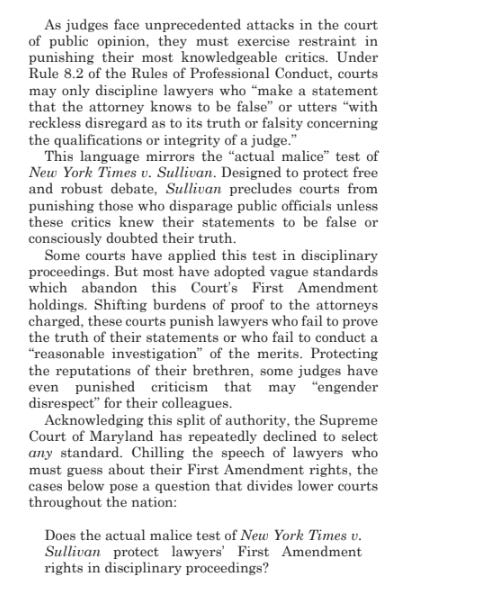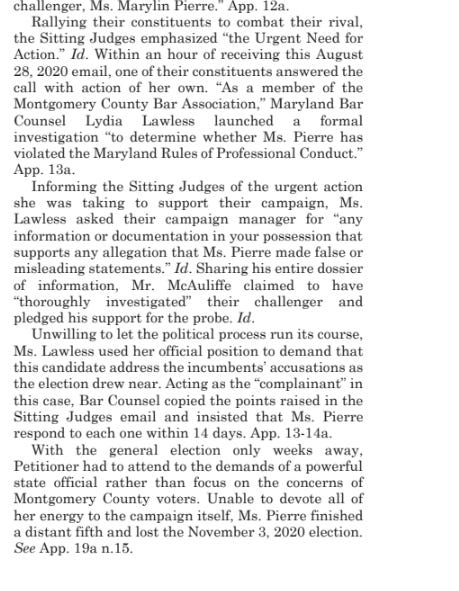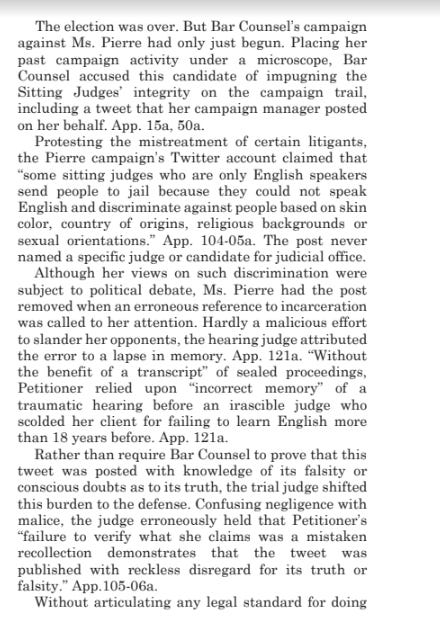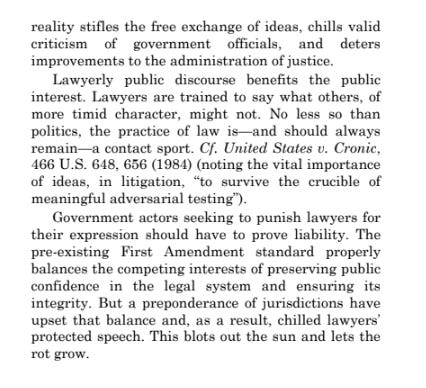Lawyers' first amendment rights under siege, according to two US Supreme Court petitions
Think you have a first amendment right; think again if you are an attorney criticizing a judge.

Two petitions filed with the US Supreme Court argue that lawyers lose their first amendment rights when they criticize judges.
One petition was filed by Michelle MacDonald on her own behalf while a second was filed by Irwin Kramer on behalf of two Maryland attorneys, Asher Weinberg and Marilyn Pierre.
All three faced serious disciplinary action from their state’s respective BARs after criticizing judges.
Both petitions cite a vital US Supreme Court case on defamation- New York Times V Sullivan- in their defenses.
New York Times Vs Sullivan established the legal principle of actual malice, which applies to public figures like Elon Musk, Michael Jordan, LeBron, James, Donald Trump, and others.
When someone like Trump sues for defamation, he must prove actual malice. That requires him to not only show that the defaming material was false but that the author knew or should have known it was false.
This is a very difficult standard for those suing to overcome, and that’s why Trump constantly complains about American defamation laws.
Both petitions argue that the Sullivan standard is supposed to be used when punishing lawyers.
“As judges face unprecedented attacks in the court of public opinion, they must exercise restraint in punishing their most knowledgeable critics. Under Rule 8.2 of the Rules of Professional Conduct, courts may only discipline lawyers who ‘make a statement that the attorney knows to be false’ or utters ‘with reckless disregard as to its truth or falsity concerning the qualifications or integrity of a judge.’” Kramer’s petition states.
Both petitions argue that the BAR disciplinary process has thrown out this standard in favor of a vague and undefined standard, making criticism of judges tantamount to ending a lawyer’s career.
Michelle’s petition argued, “Whether the disciplinary proceedings for attorneys can constitutionally abrogate First Amendment Rights when rules are used to punish speech that impugns the integrity of the judiciary without requiring a showing of knowledge or reckless disregard to truth or falsity using the constitutional and subjective standard?”
Michelle MacDonald
Michelle MacDonald had been a lawyer for nearly three decades with no disciplinary action when, in the beginning of 2013, she took on the controversial child custody case of Sandra Grazzini-Rucki (SGR).
A few months prior, the judge in SGRs case created an abomination. Judge David Knutson decided to hold a telephonic conference without the presence of either parent on September 5, 2012.

No witnesses were called, and no questions were asked or answered. Despite this total lack of due process, Judge Knutson issued an order on September 7, 2012.

That September 7, 2012, court order forcefully removed SGR from her home- under the threat of jail- and moved in David Rucki’s sister- Tami Love- to supposedly care for their five children. Neither parent was to contact the children.
Let’s state the obvious. David Knutson is corrupt as the day is long. He didn’t respond to my email for comment; he doesn’t like me.
If Michelle ever said anything like that, she would face discipline from the BAR. In fact, she has faced discipline from the BAR twice for calling out Knutson’s behavior on September 5 and 7, 2012.
First, she filed complaints with the Board of Judicial Standards. For this filing, where she pointed out that what happened on September 5 and 7, 2012 was unethical, she received a sixty-day suspension.
Then, in 2018, she did an interview on WCCO while running for Minnesota Supreme Court, where she referred to the September 5, 2012, telephonic conference as having, “no {due} process.”
She’s now indefinitely suspended. How dare she say there was no due process in Judge Knutson’s court.
What happened may pass for due process in Iran, North Korea, and Russia, but it does not pass for due process in the US.
The entire State of Minnesota has been trying to cover up everything which happened in the Rucki case. That includes the media. Here is part of what Minnesota Lawyers Weekly wrote about this new petition. It’s behind the paywall so here is a screenshot.
The author of this piece is Laura Brown, and here is the email I sent her.
Ms. Brown,
My name is Michael Volpe. I'm an investigative journalist and I run this site.
You recently wrote an article about Michelle MacDonald's brief to the US Supreme Court. The article is attached. In the article, you claimed that Ms. MacDonald falsely claimed that Judge Knutson acted unethically. I don't think that's a false statement.
If you go to 1:10:00 of this video, you will see Ms. MacDonald wheeled in, Lawyer Handcuffed and Strapped to Wheelchair For Client's Trial (youtube.com)
Do you think it is unethical for a judge to force lawyer to be handcuffed and then to force them to conduct part of a custody trial handcuffed? You should notice that her client is then missing. Is that unethical?
I'm attaching the transcripts from the September 5, 2012, telephonic conference. G168 1201 0669 | PDF (scribd.com)
This conference led to the September 7, 2012, court order, G168 1201 0006 | PDF (scribd.com)
Do you think it's ethical to hold a non hearing with neither parent present. This conference had no witnesses. Is that ethical? Is it ethical to just have several people speaking extemporaneously back and forth and then to issue an order which removes one parent from the home and moves in an aunt, Tami Love.
So, when you said Michelle falsely accused Judge Knutson of being unethical, what did you mean? Do you think his behavior in the Rucki case was ethical?
She did not respond to my query. Lest we forget that in September 2013, the same corrupt Judge David Knutson forced Michelle to conduct part of a custody trial with no client, no notes, no computer, and handcuffed to a wheelchair. Go to 1:10:00 for the beginning of that atrocity.
Michelle is the one being punished. Below is the entire eight-hour BAR disciplinary hearing: yes, they needed eight hours.
I also reached out to the Minnesota BAR, but they did not respond.
Kramer represents two Maryland lawyers- Asher Weinberg and Marilyn Pierre- who also faced dubious BAR discipline after criticizing judges.
{Check out my recent article which picks apart the false conviction of SGR}
Marilyn Pierre
Pierre was, like MacDonald, running for judge when she put out a tweet with inaccurate information.
In reality, insider judges didn’t like her candidacy, so they unleashed the BAR on her. Here is more from Kramer’s petition.
The tweet in question argued falsely that judges jailed people who didn’t speak English. This was based on the faulty memory of a previous defendant who didn’t speak English but wasn’t jailed. Pierre even had the tweet removed, but she was disciplined anyway.
Asher Weinberg
Asher Weinberg had a client who was falsely accused of petty theft. An eyewitness gave a description which did not match his client, but prosecutors continued to dig.
The prosecutor showed witnesses grainy footage of the robbery and those witnesses first claimed that the person in the footage was Weinberg’s client. After speaking with Weinberg, they changed their testimony.
Facing the obliteration of the case, the prosecutor- with no evidence- suggested that this was happening due to improper influence from Weinberg.
The judge, Pamela Alban, sprang into action. Judge Alban had previously worked with the prosecutor, and she must have forgotten what job she had.
Acting as the prosecutor, she suggested that Weinberg needed to be removed because he may become a witness. There was no evidence that Weinberg tampered with witnesses, and the judge would need to hold a hearing to determine it. That didn’t matter in Judge Alban’s court. She forced Weinberg’s withdrawal from the case.
His client went back to jail and later accepted a plea deal with no more jail time.
Months later, Weinberg was in front of Judge Alban, when he asked her to recuse herself. In his argument, he called her a “liar” and a few other nasty words. For his diatribe, he too faced discipline.
Even though calling someone a liar is an opinion- and thus protected from a defamation lawsuit- Weinberg faced punishment which completely disregarded the precedent of New York Times Vs. Sullivan.
I reached out to the Maryland Grievance Board, which punished Pierre and Weinberg, but they did not respond.
I reached out to Mr. Kramer, who said he did not have time to speak, but he did provide me with an Amicus brief from the First Amendment Lawyers Association (FALA), which also cited New York Times Vs Sullivan as the necessary standard.
An amicus brief is filed by interested parties not directly related to the case. In this case, FALA filed a brief in support of Kramer’s argument.
The brief argues that any other standard besides Sullivan chills free speech. Judges have long been recognized as public figures like Trump.
In both Michelle’s and FALAs briefs, they refer to a book by Margaret Tarkington: Reclaiming the First Amendment Rights of Lawyers.
I reached out to Ms. Tarkington, but she did not respond to my voice mail.
That book argued that lawyers all over the country face the same kinds of legal peril as the three lawyers here when they- among other things- criticize judges.
Update:
I initially got the terminology wrong. Michelle and Irwin filed petitions asking for writs. I initially called the petitions writs.
















